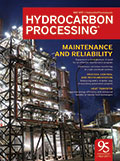Special Focus: Maintenance and Reliability
This case study aims to provide the root cause analysis behind bearing failure of an induced (ID) fan at a new refinery startup in 2015.
Oil refineries and large petrochemical plants contain thousands of pieces of process and utilities equipment that are subject to wear, erosion, deterioration, aging, etc., resulting in increasing breakdowns and outages. Imagine being a maintenance engineer and receiving 50 work orders during an overhaul with a limited budget, time, labor, spare parts, tools, machines, etc. How does that engineer prioritize the work?
Nagarjuna Fertilizers and Chemicals Ltd. (NFCL) operates a large, modern, integrated ammonia-urea complex with an annual capacity of 1.6 metric MMtpd of urea from natural gas feedstock. The facility is laid out in two units, located in Kakinada in India’s coastal state of Andhra Pradesh.
The growing availability of light tight oils (LTOs) is resulting in a choice for refiners between upgrading metallurgy or chemical inhibition and corrosion monitoring to manage the increased corrosion risk. With tight budgetary constraints in place, many oil companies are opting for chemical inhibition and online corrosion monitoring.
Piping and process equipment that operate at high temperatures experience thermal expansion. If free thermal expansion is restrained, mechanical stresses are created within the component.
Process Control and Instrumentation
Historically, automation projects have been executed as single-transaction projects. Often, individual projects, along with phases within a given project, are bid with the potential for new vendors and different engineering teams.
Fired process heaters are one of the most critical pieces of equipment within many refinery and petrochemical facilities. Proper instrumentation and control of the equipment has direct bearing on the successful operation of the process, as well as on overall facility process safety.
Heat Transfer
From 2008 to date, 45 twisted tube heat exchangers and bundles have been installed at BAYERNOIL refineries in different units and services, allowing higher heat recovery and contributing to BAYERNOIL’s energy targets.
Environment and Safety
Over the last 35 yr, more companies worldwide have installed liquid sulfur degassing processes in their sulfur recovery units (SRUs) to minimize the dangers of the release of hydrogen sulfide from the produced elemental sulfur.
Safety incidents have occurred since the beginning of time. If a “hunter-gatherer” failed to return at the end of a day, the remaining group members took it in stride.
Show Preview
Three co-located events allow for ease of networking and attendance in one of Europe’s most renowned cultural and artistic centers.
Columns
This issue of <i>Hydrocarbon Processing</i> tackles one of the most integral aspects of the downstream industry (or any industry, for that matter): maintenance and reliability. These two terms go hand-in-hand and help to ensure efficient and safe operations.
By definition, all gear units have teeth. These teeth are designed and produced to a certain strength, or a defined force-on-tooth, or an allowable pressure-load on tooth.
For the connected enterprise, what was once just a futuristic ideal is now becoming a reality. Step by step, organizations are beginning to put together the pieces of the Industrial Internet of Things (IIoT).
Attracting new investments is vital to revive the Argentine oil industry. It is essential to involve multinationals, due to the lack of financial resources of the Argentinian government. The modernization of the country’s downstream infrastructure is crucial to improve productivity, and the nation will need international support to obtain profitable results.
The Coffeyville plant is the only operating plant in North America using a petroleum coke gasification process to make hydrogen, a key ingredient in its manufacturing process.
I have spent most of my career in the mechanical engineering technical area because that is what I do best. I was a manager of advanced engineering for many years, but then realized that it was not my calling.
Trends and Resources
Founded in 2009, Gulf Publishing Company and Hydrocarbon Processing’s International Refining and Petrochemical Conference (IRPC) provides a series of events for the international downstream industry covering technical innovations, and exploring both the challenges and opportunities found in today’s market.
Annual bottom-line losses due to equipment failures total more than $100 MM at major refineries and petrochemical complexes. Corporate executives charge plant personnel with improving the reliability of the facility.
A lack of gasoline export opportunities amid increasing inflows of middle distillates impacted the European market. Stronger US domestic gasoline demand and falling inventories ahead of the transition to summer-grade quality supported refinery margins. The Asia market was impacted by a stronger domestic gasoline demand amid an upcoming switch to summer grades.
A global LNG supply glut has put many mega-LNG projects in doubt in 2017. This predicament has many industry experts heralding it as the end of the mega-LNG project era.

- SkyNRG starts construction on its first SAF plant in Delfzijl, the Netherlands 2/13
- India's Reliance wins U.S. license for Venezuelan oil 2/13
- Singapore light distillates stocks hit over 3-yr high on robust imports 2/13
- Three contractors injured at ExxonMobil facility in Beaumont, Texas (U.S.) 2/13
- China's epic renewables boom lifts it into rare clean capacity club 2/13
- TotalEnergies booked loss in France due to refining activities, CEO says 2/13





